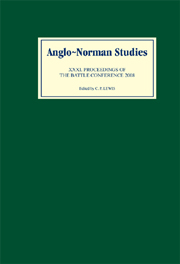Book contents
- Frontmatter
- Contents
- LIST OF ILLUSTRATIONS, MAPS, AND TABLES
- EDITOR'S PREFACE
- ABBREVIATIONS
- Kingship, Lordship, and Community in Eleventh-Century England (R. Allen Brown Memorial Lecture)
- Citadels of God: Monasteries, Violence, and the Struggle for Power in Northern England, 1135–1154
- Writing Civil War in Henry of Huntingdon's Historia Anglorum
- Land, Family, and Depredation: The Case of St Benet of Holme's Manor of Little Melton
- Brothers at Court: Urse de Abetot and Robert Dispenser
- Gerald of Wales and the Prophet Merlin
- The First Hundred Years of the Abbey of Tiron: Institutionalizing the Reform of the Forest Hermits
- All Roads Lead to Chartres: The House of Blois, the Papacy, and the Anglo-Norman Succession of 1135
- The Vita Ædwardi: The Politics of Poetry at Wilton Abbey
- William of Malmesbury, King Henry I, and the Gesta Regum Anglorum
- Twelfth-Century Receptions of a Text: Anglo-Norman Historians and Hegesippus
- LIST OF CONTENTS OF VOLUMES 1–30
The Vita Ædwardi: The Politics of Poetry at Wilton Abbey
Published online by Cambridge University Press: 12 September 2012
- Frontmatter
- Contents
- LIST OF ILLUSTRATIONS, MAPS, AND TABLES
- EDITOR'S PREFACE
- ABBREVIATIONS
- Kingship, Lordship, and Community in Eleventh-Century England (R. Allen Brown Memorial Lecture)
- Citadels of God: Monasteries, Violence, and the Struggle for Power in Northern England, 1135–1154
- Writing Civil War in Henry of Huntingdon's Historia Anglorum
- Land, Family, and Depredation: The Case of St Benet of Holme's Manor of Little Melton
- Brothers at Court: Urse de Abetot and Robert Dispenser
- Gerald of Wales and the Prophet Merlin
- The First Hundred Years of the Abbey of Tiron: Institutionalizing the Reform of the Forest Hermits
- All Roads Lead to Chartres: The House of Blois, the Papacy, and the Anglo-Norman Succession of 1135
- The Vita Ædwardi: The Politics of Poetry at Wilton Abbey
- William of Malmesbury, King Henry I, and the Gesta Regum Anglorum
- Twelfth-Century Receptions of a Text: Anglo-Norman Historians and Hegesippus
- LIST OF CONTENTS OF VOLUMES 1–30
Summary
The eleventh century has traditionally been constructed as a fallow period for English literary culture. The end of the tenth century and the very beginning of the eleventh century saw the monastic learning of the Benedictine Reform and a vibrant tradition of vernacular homiletic prose (Ælfric and Wulfstan). The eleventh century was followed by the explosion of historical and fictional writing in both Latin and French which characterizes the ‘renaissance’ of learning and culture in the Anglo-Norman realm. England, once on the periphery of Europe, is seen to have been brought into this ‘renaissance’ as a result of the Conquest. In between the early eleventh and the early twelfth centuries, nothing much literary is thought to have happened. Amidst the political and linguistic upheavals of the Danish and Norman conquests, the once robust and distinctively vernacular literary culture of Anglo-Saxon England appears to have withered away, reduced to the zealous copying of older homilies, to the preservation of an increasingly fossilized form of English poetry, and to the cultivation of Latin historiography and hagiography by foreignborn clerics, often for women.
This orthodox interpretation needs to be overhauled. One avenue in this reinterpretation is the exciting work being done on the continuity of English into the thirteenth century, especially in the manuscripts project being led by Elaine Treharne and Mary Swan. Here I will take another route, a study of history-writing and poetry, to argue that, far from being an interlude, the eleventh century marked a rich and vibrant period of creativity for English literature.
- Type
- Chapter
- Information
- Anglo-Norman Studies 31Proceedings of the Battle Conference 2008, pp. 135 - 156Publisher: Boydell & BrewerPrint publication year: 2009



